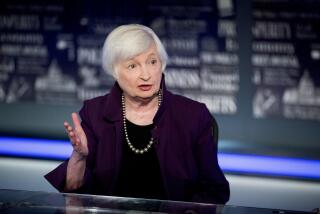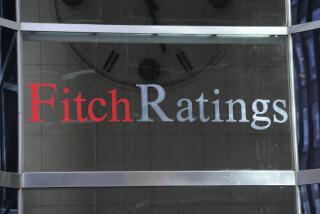Fitch Puts Countrywide on ‘Credit Watch’
- Share via
A major credit rating firm on Thursday threatened to lower the ratings of $18 billion worth of bonds and debt issued by Countrywide Financial Corp. over concern about the mortgage banker’s loan servicing business.
Fitch Ratings said it put the Calabasas-based home loan company on a “credit watch” because it feared that the ongoing refinancing boom would force Countrywide to reduce the estimated value of the fees it receives to collect payments and provide other services over the life of the mortgages.
If enough mortgages are repaid sooner than expected, lenders have to adjust the earlier gains to account for a drop in fee income.
Fitch said it might cut the A rating of Countrywide’s convertible bonds as well as the ratings on notes, preferred stock and commercial paper issued by the company’s home-loan unit.
Shares of Countrywide fell $1.55 to close at $53.10 on Thursday on the New York Stock Exchange.
Countrywide, which could find it more expensive to issue bonds and other debt if its ratings are cut, said Fitch’s action was unwarranted. Last year Countrywide reduced the value of its loan servicing fees by $3.4 billion, which was more than offset by profit generated by new loans and other financial measures, said Chief Operating Officer Stanford L. Kurland.
Kurland said mortgage rates -- already at historical lows -- would have to drop substantially more to pose a significant risk to the current value of Countrywide’s loan servicing fees.
Fitch’s credit watch is “inappropriate given the history of the company’s performance,” Kurland said.
The rating firm also raised concerns about Countrywide’s growing sub-prime loan business -- which finances mortgages to individuals with poor credit -- home equity lines of credit, jumbo mortgages and adjustable-rate mortgages.
The agency said it was harder to predict the long-term performance of such loans and the value of related mortgage service fees compared with that of conventional, fixed-rate mortgages.
More to Read
Inside the business of entertainment
The Wide Shot brings you news, analysis and insights on everything from streaming wars to production — and what it all means for the future.
You may occasionally receive promotional content from the Los Angeles Times.










